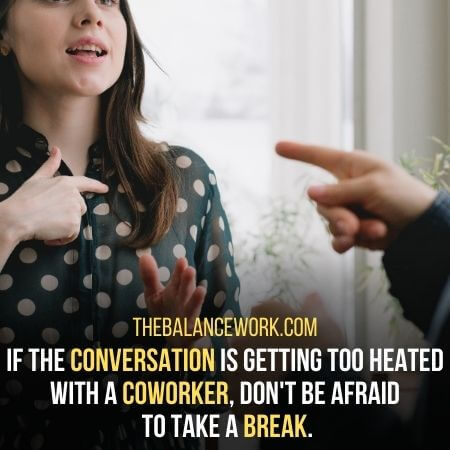Workplace relationships can change unexpectedly. Wondering why my coworker stopped talking to me who used to be friendly?
If that’s your query, we are here to help. It can be complex and confusing when someone close to you suddenly stops talking.
Key Takeaways
- Your coworker might have stopped talking to you because something you said or did upset them.
- It’s tough when a coworker stops talking to you due to a simple miscommunication or bigger problems.
- Whether you’re at fault or not, it’s crucial to talk to your coworker if they’re not speaking to you.
- Before starting a conversation with your coworker, take a moment to plan what you want to say.
- After talking with your coworker, work together to find a solution to prevent the issue from happening again.
6 Reasons Why My Male Coworker Suddenly Stopped Talking To Me
Let’s discuss the possible reasons why my coworkers don’t talk to me.
Also, let’s tell you what to do about them. Below are the reasons:
1. You Offended Them:
Your coworker might have stopped talking to you because something you said or did upset them.

It may include:
– Making a racist, sexist, homophobic, or offensive joke
– Gossiping about them behind their back
– Talking bad about their family and friends
– Saying something that hurt their feelings
If you think you’ve upset your coworker and they’re not talking to you, it’s best to apologize.
You can start by saying:
“I’m sorry for what I said/did. I was wrong and didn’t mean to hurt your feelings.”
Or
“Please forgive me. I was wrong, and I want to fix things.”
2. They Might Be Going Through A Rough Time:
Your coworker might be going through a tough time, which is why they’re not talking to you.
Here are some things that could be happening in their life:
– Going through a difficult breakup.
– Having financial troubles.
– A family member is sick or has died.
– They’re dealing with personal issues.
In this scenario, the best thing you can do is give them some space and tell them you’re there for them if they need to talk.
You can say something like:
“I’m here for you if you need to talk.” Or “I’m worried about you. Is everything okay?”
3. You Ignored Them:
If you haven’t had time for your coworkers or you’ve been avoiding them, they might think you don’t want to talk.
That could be why they stopped talking to you.
To fix things, try reaching out and saying something like,
“Hey, I noticed we haven’t talked in a while. How are you?”
4. They Think You Did Something Wrong:
Your coworker might believe you did something wrong, even if you didn’t mean to.

If this is the case, clarifying and explaining the situation is important.
For example:
“Sorry about the meeting yesterday. I didn’t mean to talk over you; it was a mistake.”
5. There’s Some Workplace Drama:
There might be workplace drama that you’re unaware of, such as:
Your coworker might be upset thinking you’re getting too much credit for a project.
– They could be feeling jealous of your success.
– They might believe you’re trying to make them look bad.
It’s best to talk to your coworker directly if there’s a workplace drama.
Try to understand the issue and find a solution.
6. They Don’t Like You:
Your coworker might not like talking to you, and there might not be a specific reason.
If that’s true, there isn’t much you can do. Just try being friendly and see if things change.
For Example,
“I noticed you’ve been avoiding me. Is there something wrong?”
How To Have A Conversation With Your Coworker Who Isn’t Talking To You
Whether you’re at fault or not, it’s crucial to talk to your coworker if they’re not speaking to you.
This conversation can clear the tension and resolve the issue.
Here are some tips for approaching the conversation:
1. Choose A Good Time/ Place To Talk:
Choose a quiet time at work to talk.
Find a private spot like an empty meeting room or your office.

Avoid discussing it in front of others to avoid making your coworkers uncomfortable.
2. Be Ready For The Conversation:
Before starting the conversation, take a moment to plan what you want to say.
This will keep the conversation on track and help it go smoothly.
Also, be prepared in case your coworker isn’t ready to talk.
You can say, “I understand if you’re not ready to talk yet. Just know that I’m here whenever you need.”
3. Be Respectful And Open-Minded:
When talking to your coworker, be polite and calm your voice.
This will make the conversation more comfortable.
Show them you’re trying to understand by being open to hearing their side.
Remember, there might be different ways to see the situation.
4. Be Honest And Clear:
When you talk to your coworker, be honest about your feelings.
For example, you could say, “I feel hurt and disappointed that you won’t talk to me.”
But avoid making them feel guilty or pressuring them to talk.
5. Don’t Be Afraid To Take A Break:
If the conversation is getting too heated, don’t be afraid to take a break.
This will help cool down the situation and give you both time to calm down.

You can say, “I think we need a break. Let’s talk again in a few minutes.”
After the break, you can start the conversation again.
6. Avoid Blaming:
When you talk to your coworkers, avoid blaming them. It will make them defensive and less likely to listen to you.
Instead of blaming them, try to focus on finding a solution.
For instance, you can say something like:
“I know this situation is difficult. But I’m confident we can figure it out if we work together.”
Without a solution-oriented mindset, it’ll be hard to fix the problem.
7. Try To Find A Solution:
After talking with your coworker, work together to find a solution to prevent the issue from happening again.
This shows your effort to resolve things.
If you’re unsure how to proceed, ask your coworker for their thoughts.
You could say, “What do you think we can do to resolve this?”
8. Be Willing To Compromise:
If resolving the situation is tough, be willing to compromise.
This means meeting halfway and making sacrifices.
For instance, adjust schedules or collaborate on projects together.
You could also agree to take a break from the friendship. Ensure both of you are comfortable with the solution.
9. Take Responsibility For Your Actions:
If you played a role in the situation, take responsibility for it.

This shows your coworker that you understand your part and want to improve things.
You could say, “I know I didn’t handle it well. I apologize for my actions.”
10. Follow Up After The Conversation:
After you talk, make sure to follow up with your coworker.
Show you’re committed to fixing things by following up.
You can email or talk directly, saying, “Just checking in to ensure we’re okay.”
Conclusion:
It’s tough when a coworker stops talking to you due to a simple miscommunication or bigger problems.
If this happens, listen to their side, share how you feel honestly, and avoid blaming.
Focus on finding a solution together.
Last Updated on 12 months by Usama Ali
- Why Does My Boss Wink At Me? 6 Potential Reasons - October 5, 2023
- Is It Legal For Your Employer To Call Your Doctor? No, But… - October 4, 2023
- 12 Ways To Deal With A Low IQ Person - September 22, 2023